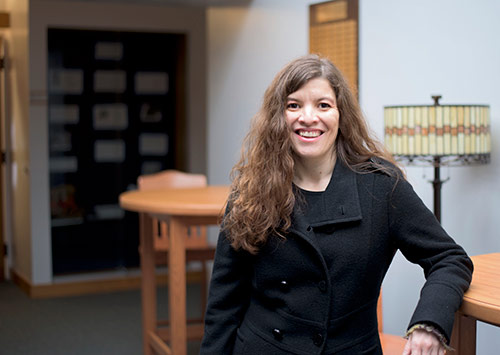Luther College professor to deliver third lecture in series
October 26, 2020

Anita Carrasco
The third lecture in the Latino/Latin American Studies Fall 2020 Webinar Series will explore indigenous peoples’ resistance to the impacts of mineral extraction and the voracious consumption of water by mining companies in South America.
“Culture as Resistance in the Chilean Andes: An Indigenous Community’s Struggle for their Rights and Recognition in the Face of Mining” will be presented by Anita Carrasco at 7 p.m. Wednesday, Nov. 4 via Zoom. A link will be provided about a week before the lecture.
Carrasco’s lecture was postponed in early March due to COVID-19. Her lecture is free and open to the public.
The theme of the Fall Series is “Race, Gender and Power in Latin America,” and is sponsored by the Latino/Latin American Studies Department at the College of Saint Benedict and Saint John’s University.
Carrasco, an associate professor of anthropology at Luther College in Decorah, Iowa will examine Likantatay, an urban indigenous community located in Calama, Chile – the gateway to the Atacama Desert. In 1991, a group of 36 Atacameño immigrant families, driven by the marginal conditions in which they lived in the city, settled in a former pasturing zone in the poverty belt of the city.
It was barren land with no public services or houses to live in. These families had to build their homes from the ground up. Most were slum dwellings with dirt floors and makeshift construction.
From its beginnings, the people of Likantatay asserted that their main objective has been to reproduce their “traditional” Atacameño community, but in an urban space.
Carrasco’s lecture will address the struggles Likantatay faces – the impacts of copper mining on their community, their displacements from a rural lifestyle because company’s extraction of water in the desert to the threat of a forced resettlement.
Carrasco received her Ph.D. in Cultural Anthropology from the University of Arizona in 2011.
She has conducted ethnographic fieldwork in northern Chile for two decades. Her book “Embracing the Anaconda: A Chronicle of Atacameño Life and Mining in the Andes” (Lexington Books) was released in May and is available at bookstores. Her research “centers on the impacts of mining on the environment and indigenous people’s livelihoods and culture, according to her biography on Luther College’s website.
“I developed a fascination with understanding how culture shapes the way people view the world and others in it,” Carrasco said on the website. She grew up in a small mining town in Chile before moving to Australia at the age of nine. “Other children were asking me if there were computers where I came from, if we slept on beds, and if we wore feathers on our heads,” she said.
This experience is what led her to study anthropology and conduct research on indigenous mining towns.
Roy Wagner, one of the world’s most influential anthropologists, wrote “The Invention of Culture,” a book that explores the idea of culture as an art form. Wagner also presents the idea that creation makes culture visible. In her lecture, Carrasco will use these ideas to discuss Likantatay’s struggles and survival.
“Culture as Resistance in the Chilean Andes: An Indigenous Community’s Struggle for their Rights and Recognition in the Face of Mining” is the third of four lectures in the LLAS Fall Event Series. The final lecture is Dec. 9, and will be presented by Ann Twinam, professor of history at the University of Texas at Austin, on “Whiteness and the Casta System in Colonial Latin America.”
